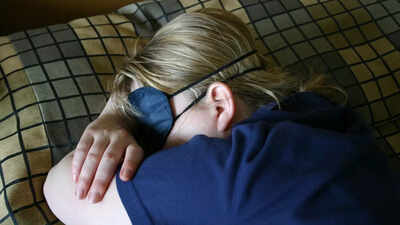NASA scientists issue ‘urgent’ warning: Social jet lag is the dangerous sleep habit you are ignoring | – The Times of India

When we hear the term “jet lag,” most of us instantly picture the disorientation and exhaustion after crossing multiple time zones on a long-haul flight. But what if jet lag could happen without ever boarding a plane? Recent research, including insights from NASA sleep experts, reveals that millions of people worldwide experience a phenomenon called social jet lag—a chronic misalignment between their internal body clocks and daily schedules, leading to fatigue, poor focus, and impaired health.Unlike traditional jet lag, social jet lag sneaks into your life through inconsistent sleep habits, such as sleeping in on weekends or staying up late, confusing your body’s natural rhythm. Understanding this silent disruptor of sleep is key to improving your overall well-being and reclaiming energy that seems lost without explanation.
What is social jet lag and why NASA scientists say it’s dangerous
Social jet lag occurs when there is a mismatch between your internal circadian clock—your body’s natural 24-hour rhythm—and the social obligations or lifestyle choices that dictate your sleep-wake schedule. For example, if you go to bed late on weekends and sleep in to “catch up,” your body’s rhythm becomes desynchronized from your weekday schedule. NASA’s sleep researchers Erin Flynn-Evans and Rachel Jansen have studied this phenomenon extensively, particularly in astronauts who live without natural day-night cues but manage to maintain regulated sleep patterns through strict scheduling and environmental controls.
NASA sleep warning: Why social jet lag is worse than you think
Astronauts aboard the International Space Station face extreme challenges to sleep due to the absence of a traditional day-night cycle—experiencing 16 sunrises and sunsets every 24 hours. Yet, with careful planning, NASA has helped them achieve better sleep than many people on Earth. Flynn-Evans and Jansen emphasize the “sacred” nature of the circadian rhythm and warn against disrupting it through inconsistent sleeping patterns.Jansen explains that when people sleep in on weekends, it creates social jet lag by shifting their body clocks out of sync with their usual routines. This disruption results in sluggish mornings, poor sleep quality, and an ongoing feeling of playing catch-up—even if you spend more hours in bed.
NASA exposes why sleeping more on weekends can make you groggy
It may seem intuitive that sleeping extra on weekends helps recover lost rest, but research and expert testimony suggest otherwise. Flynn-Evans points out that oversleeping on non-workdays can intensify sleep inertia—the groggy, disoriented feeling you get upon waking. This is not caused by your mattress or bedtime app, but by your body’s confusion over shifting sleep times.Studies reveal that people, especially night owls, often suffer the worst effects. They tend to stay up late during the week and try to compensate by sleeping longer on weekends, which ironically worsens their overall sleep quality and contributes to a persistent state of fatigue.
The health risks of social jet lag
Social jet lag isn’t just a minor annoyance affecting Monday mornings—it has serious, measurable impacts on health. Scientific research has linked it to a higher risk of cardiovascular problems, metabolic disorders such as diabetes, weight gain, and worsened mental health outcomes including anxiety and depression.Shift workers provide a vivid example, as their constantly changing schedules often prevent alignment with natural circadian rhythms. This chronic misalignment leads to poor sleep, higher stress levels, and increased susceptibility to illness.One study analyzing heart rate data found that individuals experiencing greater social jet lag showed significantly poorer sleep quality during weekdays compared to weekends. These disturbances also reduce cognitive performance, reaction times, and overall well-being, impacting daily life productivity.
How to combat social jet lag: Expert-recommended strategies
The good news is that social jet lag is reversible. NASA’s top sleep experts recommend practical methods to realign your circadian rhythm and improve sleep health:
- Sleep reset: Rachel Jansen suggests temporarily ditching alarm clocks and allowing your body to wake naturally for a few days. This reveals your body’s preferred sleep duration and timing without external interference.
- Morning light exposure: Erin Flynn-Evans emphasizes the power of natural or bright light exposure shortly after waking. Light is a crucial regulator of the circadian clock, and consistent morning light can advance your internal timing to better match your daily obligations.
- Consistent sleep schedule: Avoid large fluctuations in bedtime and wake time between weekdays and weekends. Regularity helps maintain circadian stability and reduces
social jet lag symptoms . - Environment optimisation: Maintain a cool, dark, and quiet bedroom to promote uninterrupted sleep.
If you are following these tips but still wake up exhausted, consulting a sleep specialist is advised. Persistent fatigue despite good sleep hygiene may indicate underlying sleep disorders or medical conditions requiring professional evaluation.
















